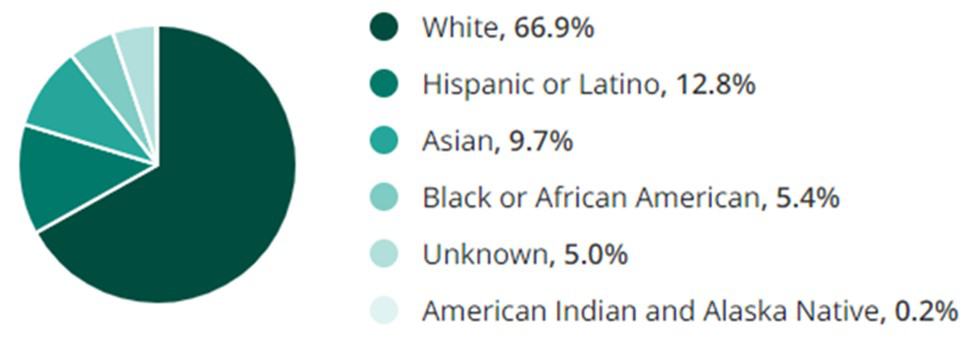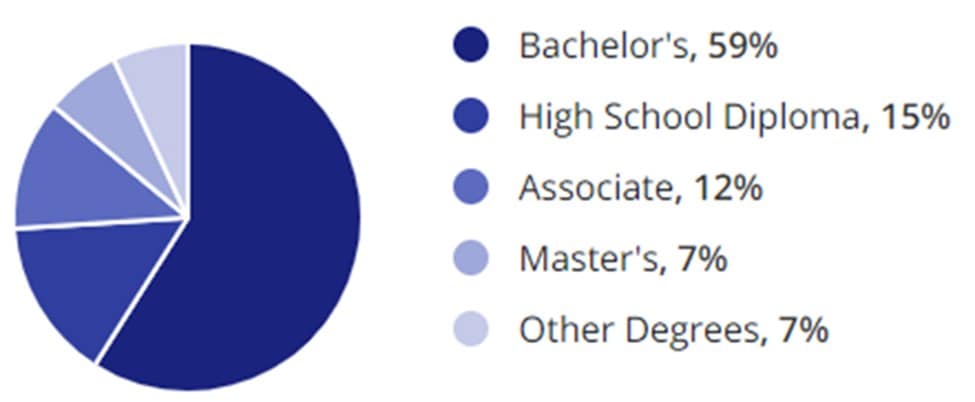Welcome to the ultimate guide to marketing jobs. In today’s fast-paced world, marketing stands at the forefront of connecting businesses with consumers, crafting messages that resonate and inspire action. This guide is designed to walk you through the exciting journey of building a career in marketing, an industry that thrives on creativity, strategic thinking, and a deep understanding of diverse audiences.
Whether you’re a recent graduate stepping into marketing for the first time or a seasoned professional looking to pivot or advance your career, this guide provides comprehensive insights into educational requirements, areas of expertise, demographic insights, salary trends, and more. We aim to equip you with the knowledge and tools needed to navigate the marketing job market successfully and spot opportunities where you can shine and grow.
Understanding the landscape is critical in a field as diverse and dynamic as marketing. The opportunities are endless, from digital marketing to market research, from creating engaging content to analyzing consumer behavior. Moreover, with the increasing importance of diversity and inclusion in shaping messages that resonate with a wide array of audiences, there’s never been a better time to pursue a career in marketing.
As you dive into this guide, you’ll discover the practical aspects of forging a successful path in marketing and the importance of embracing the diversity that makes the field so unique. Let’s start this journey together, unlocking the doors to a fulfilling and exciting career in marketing.
Educational Requirements
Stepping into a marketing career often begins with a bachelor’s degree in marketing or a related discipline. But the path doesn’t stop there; the ever-evolving marketing landscape has opened doors to countless certifications and online learning opportunities. Nowadays, you can boost your qualifications and stand out in the job market without sticking exclusively to the traditional academic route.
Highly sought-after digital marketing certifications, such as those offered by Google and HubSpot, have emerged as industry standards. They provide up-to-date knowledge and skills essential for navigating today’s digital marketplace. Whether you’re eyeing entry-level marketing jobs, marketing coordinator jobs, email marketing jobs, or digital marketing jobs, these certifications can be your ticket.
Furthermore, personal projects and internships play a crucial role. They allow you to apply what you’ve learned, providing hands-on experience that can be just as valuable as formal education. Combining a solid educational foundation with certification in trending marketing fields and real-world practice will prepare you for success in marketing jobs. Reflect on areas where the profession aligns with your passions and skills, and craft a learning path that suits your career ambitions.
Areas of Expertise
The marketing realm is vast, offering numerous specialties, each with its distinct focus. Understanding these areas can help you find your niche and excel within it. Here’s a look at some critical areas of expertise within marketing:
- Digital Marketing: This field focuses on leveraging online channels to reach consumers. Skills in SEO, content marketing, email campaigns, and social media are crucial here.
- Brand Management: Involved with shaping and maintaining a brand’s image, personality, and product offerings to stand out in the market.
- Market Research: Specialists in this area analyze data to grasp consumer behaviors and trends, guiding strategic decisions.
- Product Marketing: This specialization centers on crafting strategies to promote and sell products effectively to the target audience.
Each area demands a particular set of skills. For example, a knack for data analysis and curiosity about consumer behavior can lead you towards market research. Conversely, brand management or digital marketing might be your calling if you’re creative and have an eye for trends. The key is to align your strengths and interests with the right specialization. This not only bolsters your chance for success but also ensures a more fulfilling career in marketing jobs.
Demographics in the United States
The marketing industry in the United States celebrates a diverse workforce, bringing together people from various backgrounds and life experiences. Understanding the demographic landscape is crucial for companies striving for inclusivity and for professionals seeking opportunities in spaces where their identities are represented and valued. Here’s a breakdown of the current demographics within U.S. marketing jobs:
Ethnicity/Race:
- White: 66.9%
- Hispanic or Latino: 12.8%
- Asian: 9.7%
- Black or African American: 5.4%
- Unknown: 5%
- Native American and Alaska Native: 0.2%

Gender:
- Male: 52.2%
- Female: 47.8%
The nearly balanced gender distribution underscores ongoing efforts to achieve gender parity in marketing roles. This commitment is reflected in corporate policies fostering gender diversity and professional communities supporting women in marketing.

Age:
- The average age of marketing professionals is approximately 35 years.
This figure suggests a workforce where youthfulness intersects with experience. Young professionals contribute innovative ideas and adaptability, while seasoned veterans offer strategic depth and consumer insights.
These demographics underscore the marketing industry’s steps towards a more inclusive and representative workforce. However, there’s ongoing work to enhance diversity further. Recognizing the value of diverse perspectives affirms a commitment to the current workforce and setting an inclusive standard for future generations in marketing.

Salary Trends
Compensation in the marketing field can vary widely, reflecting factors like role, expertise, location, and years of experience. As the industry evolves, so do salary norms. Here’s a snapshot of the current salary trends for marketing professionals in the U.S.:
- Entry-level positions start around $50,000 annually.
- Mid-level roles, such as marketing specialists or coordinators, typically range from $60,000 to $80,000.
- Senior roles, including brand managers or digital marketing directors, can see salaries of $150,000 or more.
While these figures provide a ballpark, exact salaries can differ. For instance, digital marketing jobs in major urban centers like New York or San Francisco often command higher wages due to the cost of living and competitive market. Additionally, niche specializations, such as email marketing jobs, can offer higher-than-average salaries, reflecting the demand for specific skills.
Continuous skill development is critical to navigating these trends. Staying updated with the latest marketing techniques and technologies can significantly boost your earning potential. Moreover, understanding the demographic and skill sets demanded by employers can guide you in negotiating higher salaries and seeking opportunities that align with your career goals in marketing.
Hiring Trends
The landscape for marketing jobs is continuously evolving, with shifts in consumer behavior and technological advancements driving new trends in hiring. Here’s what’s currently shaping hiring trends in the marketing domain:
- Digital Emphasis: With an ever-increasing focus on online presence, there’s a high demand for professionals experienced in digital marketing, including SEO, content strategy, and social media.
- Data-Driven Marketing: Analytics and data interpretation skills are becoming more crucial. Companies seek marketers who can analyze consumer data and derive actionable insights.
- Flexibility and Adaptability: In an ever-changing market, quickly adapting and pivoting strategies is a sought-after trait.
- Remote Opportunities: The rise in remote work has opened marketing roles to a broader talent pool, emphasizing the need for solid communication and self-management skills.
Projected growth in the marketing field suggests an optimistic outlook. The emergence of new platforms and the increasing importance of a data-informed approach to customer engagement will likely continue driving the demand for skilled professionals. This means opportunities for newcomers eager to enter the field and for existing marketing professionals looking to advance their careers.
For those interested in specific roles, it’s noteworthy that jobs in specialties like digital marketing and market research analysis are particularly ripe with opportunities. Positioning yourself to grow in these areas can be a strategic move for a successful career.
Education Levels
The marketing industry values diverse educational backgrounds, reflecting the varied nature of the field itself. While a bachelor’s degree in marketing, advanced business, or a related area is commonly seen as the entry threshold, the landscape is broader. Here’s how education levels play out in marketing careers:
- Bachelor’s Degree: The typical starting point, offering a foundation in key marketing concepts and business strategies.
- Master’s Degree or MBA: An advanced degree can benefit those seeking leadership roles or specializing in digital marketing or international marketing.
- Certifications and Online Courses: With the importance of digital marketing on the rise, certifications from respected platforms or institutions can complement traditional degrees and offer an edge in the job market.
- Self-Taught Skills: Many successful marketers have carved their paths through self-learning, especially in rapidly evolving areas such as social media marketing.
This variety in educational paths mirrors the dynamic nature of marketing itself. Whether pursuing formal education or leveraging online resources to gain specialized skills, ongoing learning is crucial. The constantly changing landscape means professionals must keep their skills fresh and relevant. In essence, education in marketing is not only about the degrees you hold but also about the continuous effort to stay updated with the latest trends and technologies.

Skills in Demand
The marketing industry seeks professionals equipped with a mixture of both creative and analytical abilities. As the discipline evolves, so do the skill sets in demand. Knowing what skills are sought after can guide professionals in refining their expertise or learning new competencies. Here are some of the critical skills currently in demand in marketing:
- Digital Marketing: Proficiency in SEO, SEM, and managing social media platforms is crucial as businesses continue shifting their online focus.
- Data Analytics: The ability to analyze consumer data and derive insights for strategic decision-making is highly valued.
- Content Creation: Creating engaging and relevant content for various channels is essential for capturing audience attention.
- Brand Management: Skills in developing and maintaining a brand’s image, voice, and customer experience are critical to a company’s long-term success.
- Adaptability: Quickly adapting strategies is necessary with the constant evolution of market trends and consumer behaviors.
Soft skills such as creativity, problem-solving, and effective communication are also indispensable. They enhance a marketer’s ability to develop compelling campaigns, collaborate effectively within a team, and understand consumer needs. The most successful marketing professionals can blend technical knowledge with creativity and strategic thinking to drive meaningful engagement.
Current & Future Marketing Jobs Outlook
The outlook for marketing jobs remains bright, buoyed by the digital transformation of industries and the expanding role of data in decision-making. As businesses continue to recognize the value of strategic marketing in reaching and engaging their target audience, the demand for skilled marketing professionals is expected to grow. Here’s what you should know about the current and future outlook for marketing jobs:
- Growth in Digital Marketing: The shift towards digital platforms has increased the need for professionals with expertise in digital marketing, including content creation, social media management, and SEO/SEM.
- Analytics and Data-Driven Marketing: There’s an expanding demand for marketers leveraging data analytics to inform strategy and measure campaign effectiveness.
- Customer Experience Focus: More companies prioritize customer experience and seek professionals who can craft personalized omnichannel strategies to engage with consumers.
- Adaptability and Continuous Learning: As marketing technologies and platforms evolve, professionals who are adaptable and committed to lifelong learning will find themselves in high demand.
Industry reports project an optimistic growth rate for marketing roles over the next decade, underscoring the vitality of marketing in business success. For aspiring and current marketers, this signifies ample opportunities for career advancement and the chance to play a pivotal role in shaping the future of businesses in various sectors. Embracing the digital wave, prioritizing data analytics, and fostering a culture of continuous learning are critical for those looking to thrive in marketing.
FAQ’s
Do I Need a Degree in Marketing to Work in the Field?
No, not necessarily. While a degree in marketing or a related field is joint, many professionals enter the field with degrees in other disciplines. Certifications, online courses, and hands-on experience can also pave the way for a successful career in marketing.
What Skills Are Most Important for a Career in Marketing?
Both creative and analytical skills are crucial in marketing. Digital marketing knowledge, data analysis, content creation, strategic thinking, and adaptability are in demand. Soft skills like communication and problem-solving are also essential.
Is Marketing a Good Career Choice?
Yes, marketing is a dynamic field offering many career opportunities. It accommodates various interests and skill sets, from analytical data-focused roles to creative content creation. The demand for skilled marketers is growing, making it a promising career path.
How Can I Stay Updated on Marketing Trends?
Staying updated involves continuous learning. Follow industry blogs, attend webinars and conferences, and participate in professional networks. Additionally, certifications and courses in new marketing technologies and strategies can keep your skills sharp.
What Is the Future Outlook for Marketing Jobs?
The outlook is optimistic, with a steady demand for industry marketing professionals. Digital marketing, in particular, is experiencing significant growth alongside roles that focus on data analytics and customer experience. Continuous innovation and the importance of brand visibility ensure marketing remains a vital part of business strategy.
Additional Resources
Numerous resources can provide guidance and support for those looking to deepen their knowledge or navigate their career path in marketing. Here’s a curated list of valuable tools and websites:
- American Marketing Association (AMA) is an essential resource offering memberships, publications, and events for marketing professionals.
- MarketingProfs provides marketing education and training resources, including articles, podcasts, webinars, and more.
- edX Marketing Courses offers a wide range of marketing courses from universities worldwide, covering everything from digital marketing to strategic brand management.
- HubSpot Academy is known for offering free certification courses in various marketing specializations, including content marketing and social media strategy.
- Your local library or academic institutions. Many libraries and universities offer access to marketing journals, books, and research databases that can be invaluable for students and professionals seeking to deepen their understanding.
Utilizing these resources can enhance your marketing skills, keep you updated on the latest industry trends, and help you make informed decisions about your career path. Whether you’re just starting or looking to specialize further, these tools support your growth and development in the ever-evolving marketing field.
Conclusion
Beginning a career in marketing holds promising opportunities across many specializations and industries. The possibilities are endless with the right mix of education, skills, and continuous learning. The lively nature of marketing and the industry’s embracing of diversity make it a vibrant and exciting field. From digital marketing to brand management, the demand for skilled professionals who can navigate the complexities of consumer engagement in an increasingly digital world is on the rise.
Remember that adaptability, lifelong learning, and a deep understanding of diverse consumer bases are your keys to success. The marketing landscape is ever-changing, and staying ahead means proactively developing your skills and expanding your knowledge. We invite you to join Diversity Employment, you’ll gain access to a wealth of resources, diverse staffing jobs, and a community of professionals committed to diversity and inclusion in the workplace. Together, we can pave the way for a more inclusive and dynamic marketing industry. Start your journey with us today and unlock the door to a world of marketing opportunities!




